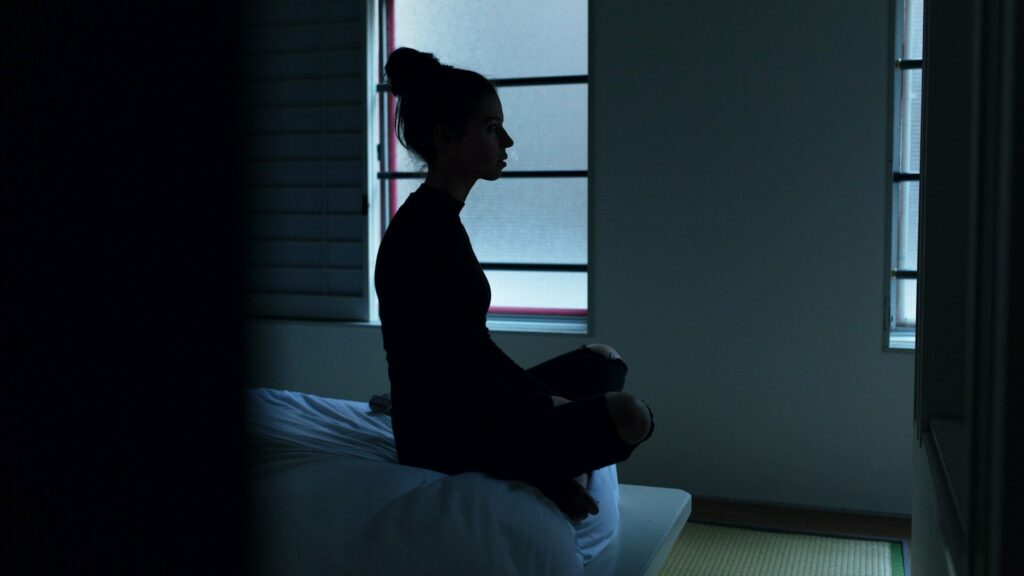How to Sleep Better Naturally: Your Ultimate Guide to Sleep and Happiness
Dakota stared at her ceiling for the third consecutive hour, her mind racing despite her exhausted body. The next morning, she dragged herself through another day feeling irritable, unfocused, and wondering why happiness seemed so elusive. Sound familiar? Dakota’s story mirrors millions of people seeking answers on how to sleep better naturally, how to sleep through the night, or how to be happy, not realizing that the secret to lasting joy might be hiding in their bedroom.
Like Dakota, many of us underestimate the profound connection between sleep and happiness. We chase external solutions for our well-being while ignoring one of the most powerful tools available to us every single night. The truth is that learning how to sleep better naturally isn’t just about feeling rested. It’s about unlocking your potential for genuine happiness and optimal health.

The Four Pillars of Health: Why Sleep Deserves Your Attention
According to Dr. Rangan Chatterjee, a renowned physician and health expert, optimal health rests on four fundamental pillars: nutrition, movement, sleep, and relaxation. Learn more about health and happiness and the four pillars of health. Moreover, learn how to relax quickly, how to become healthier through food, and about exercise for happiness.
While we often focus intensively on diet and exercise, sleep remains the forgotten pillar, yet it’s arguably the most crucial.
Think of sleep as the foundation upon which your other health efforts stand. Without quality rest, even the best nutrition and exercise programs fall short. Your body simply cannot function optimally when deprived of proper sleep. This is why understanding how to sleep through the night becomes essential for anyone serious about their health and happiness.
Sleep isn’t passive downtime. During these precious hours, your body orchestrates an intricate symphony of repair, restoration, and renewal. Every cell in your body depends on this nightly maintenance cycle to function properly the next day.

Physical Health: Why Your Body Craves Quality Sleep
Understanding how to sleep better naturally begins with recognizing sleep’s profound impact on physical health. During sleep, your body performs countless vital functions that directly influence how you feel and function.
The Physical Benefits of Prioritizing Sleep
Quality sleep strengthens your immune system, making you less susceptible to infections and illnesses. Your body produces infection-fighting cells and antibodies during deep sleep phases. Sleep also regulates hormones that control hunger and satiety, helping maintain a healthy weight. Growth hormone, released primarily during sleep, repairs muscles and tissues damaged during daily activities.
Additionally, proper rest reduces inflammation throughout your body. Chronic inflammation is linked to numerous health issues, including heart disease and diabetes. Sleep also stabilizes blood sugar levels, reducing diabetes risk significantly. Your cardiovascular system benefits enormously from adequate rest, with proper sleep lowering blood pressure and reducing heart disease risk.
The Consequences of Sleep Deprivation
Chronic sleep deprivation wreaks havoc on your physical health. Studies show that people sleeping fewer than six hours nightly face increased risks of obesity, diabetes, and cardiovascular disease. Your immune system weakens dramatically, making you vulnerable to frequent illnesses.
Sleep deprivation also disrupts hormone production, leading to increased cortisol levels and decreased production of leptin, the hormone that signals fullness. This hormonal chaos often results in weight gain and metabolic dysfunction. Your body’s ability to repair cellular damage diminishes, accelerating aging processes.
The best sleep advice emphasizes that consistent sleep deprivation can reduce life expectancy and increase cancer risk. Your body simply cannot maintain optimal function without adequate rest.

Mental Health: The Sleep and Happiness Connection
We have determined the importance of sleep in maintaining physical health. However, the main goal of this website is to learn how to be happy. Well, getting quality sleep is one of the most practical ways to increase happiness.
The relationship between sleep and happiness runs deeper than most people realize. Quality sleep directly influences your emotional regulation, stress management, and overall mental well-being. Understanding this connection is crucial for anyone wondering how to be happy.
The Science Behind Sleep and Emotional Well-being
Research demonstrates that sleep plays a vital role in emotional brain reactivity and our responses to stressful events. When we sleep, our brains undergo crucial processes that directly impact our happiness levels. During REM sleep, your brain processes emotions and consolidates memories, helping you wake up mentally refreshed and emotionally balanced.
Scientists have discovered that different sleep stages serve specific functions. Slow-wave sleep (SWS) consolidates declarative memories (facts and events) while REM sleep processes procedural memories like skills and habits. This intricate process is essential for learning how to sleep through the night and for maintaining optimal mental health.
Mental and Emotional Benefits of Quality Sleep
Adequate sleep dramatically improves mood stability and emotional resilience. Quality rest enhances cognitive function, improving focus, decision-making, and creative problem-solving abilities. Sleep also regulates neurotransmitters like serotonin and dopamine, chemicals directly linked to happiness and well-being.
When you sleep well, you’re naturally more optimistic, patient, and emotionally stable. Your stress tolerance increases significantly, making daily challenges feel more manageable. A groundbreaking four-week study with 239 participants found that people who sleep well tend to be more satisfied with their lives, regardless of individual personality characteristics.
Furthermore, proper sleep improves memory consolidation and learning capacity. You’ll find yourself more productive, creative, and mentally sharp when well-rested. The connection between sleep and happiness becomes undeniable when you experience the mental clarity that follows quality rest. Simply put, by learning how to sleep better, you will also discover how to be happy.
The Mental Health Consequences of Poor Sleep
Sleep deprivation devastates mental health in measurable ways. The famous case of Randy Gardner, who stayed awake for 264 hours, illustrates these effects perfectly. He experienced vivid hallucinations, memory lapses, fragmented thinking, speech slurring, paranoia, and severe difficulty with concentration and cooperation.
Chronic poor sleep increases the risk of depression, anxiety, and mood disorders significantly. Your emotional regulation suffers, leading to increased irritability, mood swings, and negative thinking patterns. Sleep deprivation can worsen pre-existing emotional issues, including anger, depression, anxiety, and stress, while causing confusion and fatigue.
Cognitive function declines markedly with insufficient sleep. Concentration, memory, and decision-making abilities all deteriorate. You become more prone to accidents, errors, and poor judgment calls. Stress levels skyrocket when you’re sleep-deprived, creating a vicious cycle that’s difficult to break.
The relationship between sleep and happiness becomes starkly clear when examining sleep-deprived individuals. They consistently report lower life satisfaction, increased pessimism, and reduced ability to enjoy daily pleasures. Research suggests that sleep deprivation may lead to a zero-sum mindset – believing that resources are finite and any gain comes at others’ expense. By simply learning how to sleep better naturally, you will also discover practical ways to increase happiness in your daily life.

This Week’s Challenge: Prioritizing Sleep for Better Health
This week’s challenge focuses on implementing practical ways to increase happiness through better sleep habits. The goal is simple yet transformative: commit to getting 7-8 hours of quality sleep each night while implementing natural sleep improvement strategies. By doing so, you will learn how to be happy and healthy.
Start by establishing a consistent sleep schedule. Go to bed and wake up at the same times daily, even on weekends. This helps regulate your body’s internal clock, making it easier to fall asleep and wake up naturally.
Track your sleep patterns and how you feel each morning. Notice the correlation between sleep quality and your daily mood, energy levels, and productivity. This awareness will motivate you to maintain healthy sleep habits long-term.
“Happiness consists in getting enough sleep. Just that, nothing more.” - Robert A. Heinlein
How to Sleep Better Naturally: Your Comprehensive Guide and Best Sleep Advice
Learning how to sleep through the night consistently requires implementing evidence-based strategies that work with your body’s natural rhythms. Here are the essential guidelines for optimal sleep and practical ways to increase happiness.
Dr. Chatterjee’s Three Quality Sleep Indicators
We keep mentioning ‘quality sleep’. But what does quality sleep even look like? To achieve quality sleep, we must learn how to sleep through the night.
First, you should wake up feeling refreshed and energized, not groggy or tired. Second, you should naturally wake up around the same time daily without an alarm clock, indicating a healthy circadian rhythm. Third, you should fall asleep within approximately 30 minutes of lying down, demonstrating that your daily routine supports quality rest.
How to Sleep Better Naturally: Technology and Sleep Environment
Stop using all electronic devices 90 minutes before bedtime. The blue light from screens disrupts melatonin production, making it harder to fall asleep. Put your phone in airplane mode and enable eye comfort settings if you must use devices.
Create a sleep sanctuary in your bedroom. Remove all electronic devices if possible, or at least put them in airplane mode. Use blackout curtains or blinds to eliminate outside light sources. Even small light sources can disrupt sleep quality, so remove digital clocks with bright displays.

How to Sleep Better Naturally: Temperature and Lighting Optimization
Maintain your bedroom temperature around 65°F (18.3°C) for optimal sleep conditions. Your body temperature naturally drops during sleep, and a cool environment supports this process.
Embrace morning sunlight exposure for 15 minutes to regulate your circadian rhythm. This natural light exposure helps you sleep better in the evening. Conversely, dim the lights an hour before bedtime to signal your body that sleep time approaches.
How to Sleep Better Naturally: Timing and Substances
Stop caffeine consumption by 2 PM, as caffeine can remain in your system for 6-8 hours. Avoid alcohol within three hours of bedtime; despite its initial sedating effects, alcohol disrupts sleep quality later in the night.
Finish exercising at least four hours before bedtime. While regular exercise improves sleep quality, intense physical activity too close to bedtime can be stimulating.
Additionally, to support better sleep, it’s usually advised to stop eating at least 2 to 3 hours before going to bed. This gives your body enough time to digest your food, helping prevent discomfort or indigestion that could disrupt your rest.
How to Sleep Better Naturally: Sleep Routine and Consistency
Develop a relaxing bedtime routine that signals to your body it’s time to wind down. This might include gentle stretching, reading, or meditation. Consistency is key. Follow the same routine nightly.
If you need a nap, limit it to 30 minutes and avoid napping after 3 PM. Strategic napping can recharge your energy and reduce stress without interfering with nighttime sleep.
Most importantly, learn to prioritize your sleep. Make sure to set aside at least 7-8 hours every day for your body to rest and recharge.
How to Sleep Through the Night: Additional Natural Sleep Enhancement Strategies
Still wondering how to sleep better naturally? Well, beyond basic sleep hygiene, several natural approaches can further improve your sleep quality and strengthen the sleep and happiness connection. By implementing these sleep tips and practical ways to increase happiness, you will discover how to be happy and healthy.
Mindfulness and Relaxation Techniques
Practice deep breathing exercises or progressive muscle relaxation before bed. These techniques activate your parasympathetic nervous system, promoting relaxation and easier sleep onset.
Consider meditation or gentle yoga as part of your bedtime routine. These practices calm the mind and prepare your body for rest. Even five minutes of mindfulness can significantly improve sleep quality.
Natural Sleep Aids
Certain herbal teas like chamomile, valerian root, or passionflower can promote relaxation and sleepiness. Magnesium supplements may also help some people achieve deeper, more restful sleep.
However, consult with a healthcare provider before starting any supplements. Natural doesn’t always mean safe for everyone, and some supplements can interact with medications.
Creating Sleep-Promoting Habits
Keep a sleep diary to identify patterns and triggers that affect your sleep quality. Note factors like stress levels, food intake, and daily activities alongside sleep quality ratings.
Avoid large meals within three hours of bedtime. Heavy or spicy foods can cause discomfort and interfere with sleep. If you’re hungry before bed, choose a light snack containing tryptophan or complex carbohydrates.

The Science Behind Sleep and Happiness
Research consistently demonstrates the powerful connection between quality sleep and psychological well-being. Understanding this science can motivate you to prioritize sleep as one of the most practical ways to increase happiness.
Sleep deprivation affects the brain’s emotional processing centers, particularly the amygdala, which becomes hyperactive when we’re tired. This leads to stronger emotional reactions and difficulty regulating feelings. Simultaneously, the prefrontal cortex, responsible for rational thinking and emotional control, becomes less active.
Quality sleep, conversely, allows the brain to process emotions effectively and maintain proper neurotransmitter balance. Serotonin, dopamine, and other mood-regulating chemicals function optimally when you’re well-rested.
The best sleep advice emphasizes that sleep is not a luxury but a necessity for mental health. Studies show that people who consistently get 7-9 hours of quality sleep report higher life satisfaction and better emotional resilience.
“Sleep is the golden chain that ties health and our bodies together.” – Thomas Dekker
Common Sleep Challenges and How to Sleep Better Naturally
Many people struggle with specific sleep issues that prevent them from learning how to sleep through the night effectively. Understanding common problems and their solutions can help you overcome personal sleep obstacles.
Best Sleep Advice for a Racing Mind at Bedtime
If your mind races when you lie down, try the “brain dump” technique. Write down worries, tomorrow’s tasks, or persistent thoughts before bed. This externalization often helps quiet mental chatter.
Practice the 4-7-8 breathing technique: inhale for 4 counts, hold for 7, exhale for 8. This activates the relaxation response and can help quiet an overactive mind.
Best Sleep Advice for Frequent Night Wakings
If you wake frequently during the night, avoid checking the time, as this can create anxiety about lost sleep. Instead, practice relaxation techniques or listen to calming audio.
Ensure your bedroom environment supports continuous sleep. Address noise issues with earplugs or white noise machines. Check that your mattress and pillows provide adequate comfort and support.
Best Sleep Advice for Difficulty Falling Asleep
If you can’t fall asleep within 30 minutes, leave your bedroom and engage in a quiet, non-stimulating activity until you feel sleepy. This prevents your bed from becoming associated with wakefulness.
Review your caffeine intake and timing. Some people are more sensitive to caffeine and may need to stop consumption even earlier in the day.

Conclusion: How to Sleep Better Naturally and Become Happier
The journey to understanding how to sleep better naturally isn’t just about getting more rest. It’s about transforming your entire approach to health and happiness. When you prioritize sleep, you’re investing in your physical health, mental well-being, and overall life satisfaction.
Remember that the sleep and happiness connection is scientifically proven and personally transformative. Every night offers a new opportunity to support your body’s natural healing processes and wake up ready to embrace life with energy and joy.
Start implementing these strategies tonight. Begin with one or two changes rather than overwhelming yourself with a complete sleep overhaul. Small, consistent improvements compound over time, leading to significant improvements in both sleep quality and daily happiness.
The best sleep advice is simple: make sleep a non-negotiable priority in your life. Your future self will thank you for the energy, clarity, and happiness that follow naturally from quality rest.
Quality sleep isn’t selfish. It’s essential. When you’re well-rested, you show up better for yourself and everyone around you. You become more patient, creative, and emotionally available. These practical ways to increase happiness through better sleep create ripple effects that improve every aspect of your life.
Sweet dreams, and here’s to waking up to a happier, healthier you.
If you’re ready to dive deeper into transforming your well-being, our positive psychology coaching programs help individuals develop sustainable habits for lasting happiness and life satisfaction. Sometimes, the missing piece isn’t just knowing what to do. Instead, it’s having the support and accountability to make meaningful changes stick.
Resources
The information in this article is grounded in scientific research. If you’re interested in specific studies, feel free to reach out to us.
For daily doses of joy, positivity, inspiration, and motivation, be sure to follow us on Instagram.
Za naše bralce v Sloveniji
Če vas zanima več o psihoterapiji in iskanju trajne sreče, preberite naslednje članke: Psihoterapija Obala, 5 ključev do trajne sreče in notranjega miru, Najboljši psihoterapevti v Sloveniji: Kako se hitro spopasti s stresom, Psiholog v Kopru: Kako odpraviti težave s psihoterapijo in RTT terapijo, in Psihoterapija Online: Prednosti in učinkovitost terapije na daljavo.


